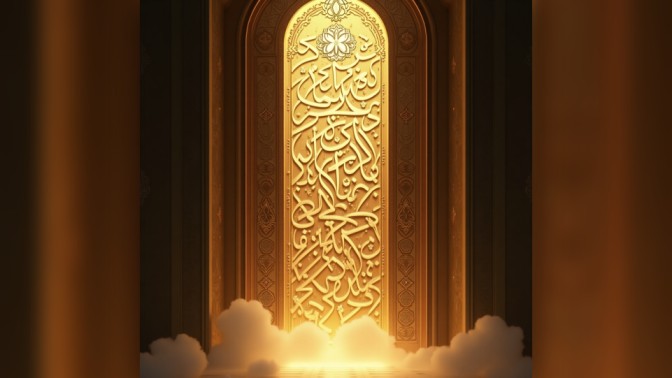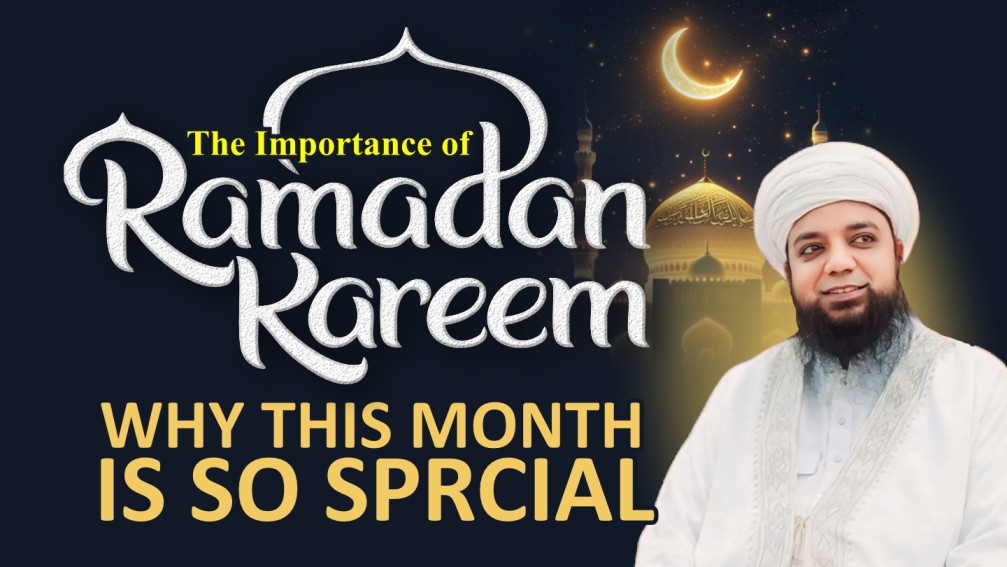O you who believe! Fasting has been prescribed upon you as it was prescribed upon those before you, so that you may attain piety. It is for a limited number of days, but whoever among you is ill or on a journey, then he should fast the same number of days later. And for those who are unable to fast, there is a compensation—feeding a needy person. And whoever voluntarily does more good, it is better for them. But fasting is better for you, if only you knew.”
Table of Contents
“The month of Ramadan is that in which the Qur’an was revealed—a guidance for mankind, containing clear proofs of guidance and the criterion (between right and wrong). So whoever among you witnesses this month, let them fast. And whoever is ill or on a journey, then let them fast the same number of days later. Allah desires ease for you, not hardship, so that you may complete the prescribed period, glorify Allah for His guidance, and so that you may be grateful.” (Surah Al-Baqarah: 183-185)
The blessed month of Ramadan is upon us—a divine gift from Allah, the Lord of Glory and Majesty, to the Ummah of Mustafa ﷺ. It is a season of divine mercy, forgiveness, and salvation.
This sacred month is like the spring of faith and righteous deeds, where the hearts blossom with spirituality, and the souls are illuminated with the light of devotion. It is an opportunity for believers to purify themselves, elevate their ranks, and draw closer to their Lord.
May we embrace this holy month with sincerity, gratitude, and unwavering devotion, so that we may attain the mercy and pleasure of Allah Almighty.
Among the twelve months of the Islamic lunar calendar, Ramadan holds the distinguished position of being the ninth month, calculated according to the lunar cycle. The sanctity and excellence of Ramadan al-Mubarak require no introduction, as its virtues are well established in the Islamic tradition.
Our Beloved and Generous Prophet ﷺ described its immense blessings and significance. As the month of Sha’ban al-Mu’azzam was drawing to a close, he conveyed glad tidings to his noble Companions (رضوان الله علیہم اجمعین) and expressed the greatness of this sacred month in these words:
“O people! A grand and blessed month is approaching you.“
The Three Sacred Phases of Ramadan
Ramadan is divided into three special phases, each carrying its own spiritual significance:
- Ashra-e-Rahmat (The First Ten Days – Days of Mercy)
- Ashra-e-Maghfirat (The Second Ten Days – Days of Forgiveness)
- Ashra-e-Nijat (The Last Ten Days – Days of Salvation from Hellfire)
As mentioned in Mishkat al-Sharif, the first ten days of Ramadan are filled with Allah’s boundless mercy, the second ten days bring divine forgiveness, and the final ten days grant freedom from the torment of Hellfire.
May we embrace this sacred month with sincerity, devotion, and gratitude, so that we may attain the mercy, forgiveness, and ultimate salvation promised by our Allah Almighty.
Thus, this sacred month is arriving—a month that guarantees divine mercy, forgiveness, and freedom from the torment of Hellfire.
The essence of this blessed Hadith is that in the first ten days of Ramadan, Allah Almighty showers His special mercy upon those who fast and engage in worship. In the second ten days, He grants forgiveness for their sins. And in the final ten days, the fortunate worshippers and sincere devotees receive a certificate of deliverance from Hellfire.
What more could a human being desire than to have their heart filled with the blessings, mercy, and grace of Ramadan? Imagine a sinful soul, burdened by the weight of its transgressions, being cleansed by the rain of Allah’s mercy, washing away the stains of sin. SubhanAllah! Such is the boundless generosity of Allah Almighty—He does not just forgive; He grants salvation from eternal punishment.
However, all these divine rewards, spiritual gifts, and immense blessings are only attainable if we embrace this sacred month with sincerity, devotion, and complete spiritual focus. O my Muslim brothers and sisters! It is possible that this may be the last Ramadan of our fleeting lives. Let us turn wholeheartedly towards Allah’s infinite mercy and strive to collect as many of its blessings as possible, for who knows if our temporary existence will remain faithful to us in the future?
As long as the sun and moon continue their celestial journey, this magnificent month of Ramadan will keep returning with all its spiritual grandeur, pouring down a torrential rain of divine mercy. Indeed, Ramadan is the month of heavenly showers—and just like rain, it blesses both the palace of the king and the hut of the beggar, the fertile land and the barren soil alike. However, each piece of land absorbs the rain according to its capacity. Though the downpour is equal, in some places, it nurtures roses while in others, it gives rise to thorny bushes.
The spiritual rain of Ramadan follows a similar pattern. If a person waters the fields of their heart with tears of repentance and nourishes it with the love of Allah and His beloved Prophet ﷺ, then righteousness, obedience, and piety will blossom within. But if a heart is irrigated with arrogance, pride, and vanity, and if it is hardened by disobedience to Allah and disrespect towards His Messenger ﷺ, then it will yield nothing but the thorns of sin, disgrace, and ruin.
May Allah grant us the ability to absorb the spiritual rain of Ramadan in the best way and cultivate within us the flowers of faith, righteousness, and devotion. Ameen!
O my dear Muslim brothers and sisters! Surrender the field of your hearts to the torrential downpour of Ramadan so that it may become lush and verdant. Just as rain purifies the air and washes the mountains and rocks clean, so too does the rain of Ramadan cleanse the soul and illuminate the heart. Alas! If only we could truly grasp the beauty and delicacy of this sacred month, we would never attempt to shield ourselves from its blessings.
Our beloved Prophet ﷺ has said that if people truly understood the grandeur of Ramadan, they would wish for the entire year to be filled with its sacred days. Blessed indeed are those fortunate souls who attain freedom from the torment of Hellfire. How privileged are those who endure hunger and thirst in devotion. Enviable are the eyes that shed tears in the remembrance of Allah. Admirable are the foreheads that remain prostrate before the Almighty. Precious are the pure hearts that find delight in the remembrance of the Divine.
We extend our deepest admiration to those who fast by day and stand in prayer by night, offering Tarawih in devotion. O my dear believers! When the season of spring arrives, its refreshing breeze revives everything in its path. Gardens bloom, barren lands transform into flourishing meadows, and even deserted plains are touched by its beauty. From rocky mountain cliffs to fertile riverbanks, from abandoned lands to thriving fields—wherever spring reaches, flowers blossom according to their nature.
Such is the beauty of nature’s spring, but have we ever pondered the spiritual spring of human existence? A season that awakens the soul, scents the heart, and brings an overwhelming sense of peace and contentment. This is the spring of divine grace, the season of inner tranquility and fulfillment, where dreams, desires, and aspirations find their realization. And among all springs, the greatest, the leader, the sovereign of them all is none other than the sacred season of Ramadan.
In this month, the winds of righteousness blow in every direction, the fragrance of goodness fills the air, and the roses of obedience to Allah and His Messenger ﷺ bloom with divine beauty. The rain of compassion and kindness showers upon humanity, while the flowers of empathy and selflessness blossom in every heart. Waterfalls of divine light sing songs of purity, dispelling the dust of ignorance and heedlessness. Thorns of envy and hatred wither away, while the leaves of arrogance and pride fall to the ground. The spirit of generosity flourishes, and the desire to serve others intensifies.
Yes, yes! When a true believer seeks ways to engage in acts of goodness, this is the blessed spring of Ramadan—the season of virtuous deeds. It is in this sacred month, bathed in the radiance of divine mercy that forgiveness and salvation bloom in their fullest splendor.
The moment the crescent moon of Ramadan appears in the sky, the entire universe is enveloped in a cloak of divine mercy and celestial radiance. The heavens are illuminated by the descending angels of light, while the sworn enemy of mankind—Satan and his minions—are shackled in chains. The forces of evil begin to dwindle, and the spirit of goodness flourishes at an accelerated pace. The ominous clouds of sin begin to disperse, making way for an environment of purity and virtue.
In this sacred atmosphere of righteousness, the weaknesses of the human soul begin to fade, while the spiritual essence of the heart and mind ascends to new heights. This elevation is so profound that the soul attains the boundless treasures of divine knowledge, reaching the pinnacle of spiritual enlightenment. And as the beauty of a believer’s righteous deeds continues to shine, the mercy of the Almighty welcomes him with open arms, proclaiming:
“O seeker of goodness, advance forward!”
Hazrat Salman Farsi (رضی اللہ عنہ) narrated that towards the end of Sha’ban, the beloved Prophet ﷺ delivered a sermon, saying:
“O people! A month of immense greatness and blessings has come upon you. It is a month in which there is a night that is better than a thousand months. Allah has made fasting in it obligatory, and standing in prayer during its nights (Qiyam) voluntary. Whoever performs a good deed in this month, it is as if they have performed seventy obligatory acts in other days. It is the month of patience, and the reward for patience is none other than Paradise. It is the month of compassion, and in it, the sustenance of a believer is increased.
Whoever provides iftar (food to break the fast) to a fasting person, his sins will be forgiven, and his neck will be freed from the Hellfire. He will also receive the same reward as the fasting person, without reducing the latter’s reward in any way.”
The companions humbly inquired, “O Messenger of Allah ﷺ! Not all of us have the means to provide iftar to a fasting person.”
The Prophet ﷺ replied:
“Allah grants this reward even to the one who offers a sip of milk, a date, or a drink of water for iftar. And whoever feeds a fasting person to their fill, Allah will quench his thirst from my fountain (تَطَوُّع), after which he shall never feel thirsty again, until he enters Paradise.
This is the month whose beginning is mercy, its middle is forgiveness, and its end is emancipation from the Hellfire. Whoever lightens the burden of their servants or workers in this month, Allah will forgive them and free them from the Fire.”
In some narrations, the Prophet ﷺ also advised:
“Engage abundantly in four things during Ramadan. Two of these will earn you the pleasure of your Lord, and two are those that you cannot do without.
The two that will earn Allah’s pleasure are:
- Reciting La ilaha illa Allah (لَآ اِلٰہَ اِلَّا اللہُ مُحَمَّدُ رَّسُولُ اللہ) (There is no god but Allah) frequently.
- Seeking forgiveness (Istighfar) abundantly.
And the two that are indispensable:
- Asking Allah for Paradise.
- Seeking refuge from the Hellfire.“
This sacred month is not just about abstaining from food and drink; it is an invitation to purify the soul, strengthen faith, and earn the mercy of Allah. It is a season of divine generosity, where every act of goodness multiplies and where the doors of forgiveness and salvation are wide open for those who seek them.
The Significance and Essence of Fasting in Ramadan
Observing the fasts of Ramadan is a fundamental pillar of Islam, a sacred obligation that holds a unique distinction both in its nature and its spiritual significance. Allah Almighty has explicitly stated the purpose of fasting in the Holy Qur’an:
“يَا أَيُّهَا الَّذِينَ آمَنُوا كُتِبَ عَلَيْكُمُ الصِّيَامُ كَمَاكُتِبَ عَلَى الَّذِينَ مِن قَبْلِكُمْ لَعَلَّكُمْ تَتَّقُون”
“O believers! Fasting has been prescribed upon you as it was prescribed upon those before you, so that you may attain Taqwa (piety, God-consciousness).”
—(Surah Al-Baqarah: 183)
Indeed, fasting is a means of suppressing worldly desires and restraining the soul from indulgence. It serves as a shield against sin and immoral acts, protecting one from spiritual corruption. Through fasting, the soul is nurtured, the heart is purified, and nearness to the Divine is attained. Therefore, it is incumbent upon the followers of Islam not to observe fasting merely in name but to embrace its true essence and fulfill its spiritual requirements.
Imam Ghazali (رحمۃ اللہ علیہ), in his profound discourse on the wisdom of fasting, categorizes fasting into three levels:
1) The Ordinary Fast (عمومی روزہ):
This refers to the basic level of fasting, where one merely refrains from food, drink, and actions that invalidate the fast according to jurisprudence. This is the fast of the common people.
2) The Special Fast (خصوصی روزہ):
Beyond the physical restraints, this fast involves guarding all senses and limbs against sinful acts. It requires not only abstaining from eating and drinking but also from engaging in any wrongdoing, whether in speech, sight, or action. This is the fast of the pious.
3) The Supreme Fast (اعلیٰ درجہ کا روزہ):
This is the highest and most spiritually refined level of fasting. It entails abstaining not only from external and internal corruptions but also from any distraction that diverts the heart from Allah. The soul remains entirely absorbed in divine remembrance, detached from everything other than the Creator. This level of fasting is the station of the Prophets, the Siddiqeen (the most truthful ones), and those closest to Allah’s court.
—(Ihya Ulum al-Din, Vol. 1, p. 133)
Fasting is not merely an act of physical restraint; it is a journey of spiritual elevation. It is an opportunity to cleanse the heart, strengthen the soul, and draw closer to Allah. True fasting extends beyond hunger and thirst—it is a state of devotion, sincerity, and inner purification.
FASTING
Hazrat Salman Farsi (رضی اللہ عنہ) narrated that the Messenger of Allah ﷺ delivered a sermon at the end of Shaban, saying:
“O people! A great and blessed month has come to you. A month in which there is a night that is better than a thousand months. Allah has made its fasting obligatory and its night prayers (Qiyam) voluntary (تَطَوُّع). Whoever performs a good deed in this month will receive the reward of seventy obligatory acts performed in other days.
Allah Almighty will grant this reward even to the one who provides iftar with just a sip of milk, a date, or a drink of water. And whoever feeds a fasting person to their fill, Allah will grant them a drink from my fountain (تَخْفِیف), after which they will never feel thirst again until they enter Paradise.
This is the month whose beginning is mercy, its middle is forgiveness, and its end is freedom from the Hellfire. Whoever lightens the workload of their servant in this month, Allah will forgive them and free them from Hellfire.
According to some narrations, The beloved Prophet ﷺ also said on this occasion: ‘Increase four deeds in this month. Two of these will please your Creator, and the other two are those which you cannot do without. The two deeds that please Allah are: continuously reciting the best remembrance (لَآ اِلٰہَ اِلَّا اللہُ مُحَمَّدُ رَّسُولُ اللہ) and constantly seeking forgiveness from Allah. The other two deeds you cannot do without are: asking for Paradise and seeking refuge from Hellfire.
Fasting in the blessed month of Ramadan is an important obligation in Islam. This act of worship holds a unique significance in terms of its nature and virtue. Allah Almighty has mentioned the true purpose of fasting in the Holy Quran, stating:
يَا أَيُّهَا الَّذِينَ آمَنُوا كُتِبَ عَلَيْكُمُ الصِّيَامُ كَمَا
كُتِبَ عَلَى الَّذِينَ مِن قَبْلِكُمْ لَعَلَّكُمْ تَتَّقُونَ
O believers! Fasting has been prescribed for you as it was prescribed for those before you, so that you may attain piety.
Indeed, fasting restrains the desires of the soul and helps in overcoming worldly temptations,
Fasting serves as a shield against sins and immoral acts. It nurtures spirituality, purifies the heart, and is a significant means of attaining closeness to Allah. Therefore, it is the duty of Muslims not to merely observe fasting in name but to truly grasp its essence and fulfill its requirements wholeheartedly.
Imam Ghazali (رحمہ اللہ) has elaborated on the secrets and wisdom of fasting, stating that fasting is fundamentally of three types.
1. The Common Fast: This refers to a fast where a person abstains only from those actions that nullify the fast as per jurisprudential rulings. This is the fast of the general public, centered solely on adhering to the legal requirements of fasting.
2. The Special Fast: In this level, not only does a person observe the outward conditions of fasting, but they also ensure that their entire being—eyes, tongue, hands, and all limbs—remain free from sin. They refrain from anything that taints the sanctity of the fast. This is the fast of the devout, those who seek deeper spiritual discipline.
3. The Most Exclusive Fast: This is the highest form of fasting, reserved for prophets, the truthful, and those closest to the Divine. Here, the individual not only safeguards themselves from all external and internal transgressions but also keeps their heart entirely devoted to Allah, untouched by distractions of the worldly life. In this state, the soul remains immersed in the pursuit of Divine pleasure and nearness.
These three levels reveal that fasting is not merely an act of abstinence from food and drink but a profound spiritual journey—one that purifies the body, mind, and soul, elevating the seeker to the ultimate proximity of Allah’s mercy.
(احیاء العلوم -۱،۱۳۳)
We, too, must constantly strive to be counted among those who observe fasting at its highest level so that we may truly reap its blessings and rewards. To achieve this, especially while fasting, we must safeguard ourselves from indulging in sinful gazes, falsehood, backbiting, anger, abusive language, and listening to immoral speech or music. Only then can we embody the true essence of fasting and attain its spiritual benefits.
It is narrated that during the blessed era of the Beloved Prophet ﷺ, two women observed fasting. As the day neared its end, they became extremely thirsty and hungry, to the point that their condition grew unbearable, and they feared for their lives. They sent a messenger to seek permission from the Prophet ﷺ to break their fast. In response, the Prophet ﷺ sent them a bowl and instructed them to vomit into it.
When one of them did so, the bowl was filled halfway with blood and fresh flesh. The other woman followed, and soon the bowl was completely full. The people were astonished at this sight. The Prophet ﷺ then explained, “These two women fasted with lawful food but broke their fast with what is forbidden. Throughout the day, they indulged in backbiting, and this blood and flesh are the manifestation of their slander.”
(احیاء العلوم )
Just pause for a moment and reflect—are our fasts truly free from these impurities? The reality is that despite observing the fast, there is often no visible change in our habits, routines, or daily engagements. This calls for serious contemplation: can we, despite these shortcomings, truly consider ourselves worthy of Allah’s mercy?
Alas! If only we could fully benefit from the blessings of Ramadan and attain the honor of true piety. May Allah Almighty be our guide and support? Ameen.
The Etiquettes of Ramadan
Keeping in view the rewards of fasting and the countless blessings of Ramadan, observe your fasts with utmost enthusiasm and devotion. For this is a form of worship so unique that no other act of devotion can serve as its substitute. It is for this very reason that fasting has been made obligatory upon all. As the Divine Command declares:
يَا أَيُّهَا الَّذِينَ آمَنُوا كُتِبَ عَلَيْكُمُ الصِّيَامُ كَمَا
كُتِبَ عَلَى الَّذِينَ مِن قَبْلِكُمْ لَعَلَّكُمْ تَتَّقُونَ
O believers! Fasting has been prescribed upon you as it was prescribed upon those before you, so that you may attain piety.
The Noble Prophet ﷺ described the purpose of fasting in these words: “Whoever observes a fast yet does not abandon falsehood and its practice, then Allah has no need for him to remain hungry and thirsty.
Observe the Fast of Ramadan with Devotion and Reverence
- Uphold the fasts of Ramadan with utmost diligence. Do not abandon them without a severe illness or a valid Shar’i excuse.
- The Beloved Prophet ﷺ has warned: “Whoever skips a single fast of Ramadan without a legitimate excuse or illness, its atonement cannot be made even if he fasts for a lifetime.”
- Guard your tongue while fasting. Falsehood, backbiting, idle talk, slander, foul language, and abusive speech all fall into the category of sins that tarnish the essence of fasting—therefore, it is essential to abstain from them.
- Lower your gaze. Ensure that your eyes do not wander towards impermissible sights or non-mahrams.
- Protect your ears. Just as uttering sinful words is forbidden, listening to them is equally impermissible. Refrain from lending an ear to anything indecent or undesirable.
- Endure the hardships of fasting with gratitude. Consider hunger, thirst, and fatigue as a divine test rather than complaining, for devaluing the fast through complaints diminishes its spiritual significance.
- Earn a livelihood through lawful means. The Noble Prophet ﷺ has stated: “A body nourished by unlawful earnings is only deserving of Hellfire.”
- Partake in Suhoor (pre-dawn meal), even if it is just a single date. The Beloved Prophet ﷺ has advised: “Eat Suhoor, for indeed, there is blessing in it.” He further stated: “Allah’s angels send blessings upon those who partake in Suhoor.”
- Do not delay Iftar after the sun has set. The essence of fasting lies in nurturing obedience to Allah, not merely enduring hunger and thirst. The Noble Messenger ﷺ has said:
“The Muslims shall remain in a good state as long as they hasten to break their fast (upon the appointed time).” - Recite this supplication at the time of Iftar:
اللَّهُمَّ اِنِّیْ لَكَ صُمْتُ، وَبِکَ اٰمَنْتُْوَعَلَیْکَ تَوَکَّلْتُ وَعَلَى رِزْقِكَ أَفْطَرْتُ
“O Allah! I fasted for You, I believed in You, I placed my trust in you, and with the sustenance provided by You, I break my fast.”
May Allah enable us to honor the sanctity of Ramadan in its true essence? Ameen.
The Forgiveness of Those Who Fast
Hazrat Abu Hurairah (RA) narrates that the Messenger of Allah (ﷺ) said:
( غُفِرَ لَهٗ مَا تَقَدَّمَ مِنْ ذَنْبَہٖ )
“Whoever fasts during the month of Ramadan with faith and sincerity, seeking reward from Allah, all his past sins will be forgiven.”
(Sahih Bukhari, Kitab al-Sawm, Bab Sawm Ramadan Ihtisaban min al-Iman, Vol. 1, Pg. 22, Hadith No. 38; Sahih Muslim, Kitab Salat al-Musafirin wa Qasriha, Bab al-Targhib)

Another narration states that not only are his past sins forgiven, but his future sins as well.
Hazrat Abu Hurairah (RA) also narrates that the Prophet (ﷺ) said:
وَ سُلْسِلَتِ الشَّيَاطِيْنُ
“When the month of Ramadan arrives, the gates of Paradise are flung open, the gates of Hell are sealed shut, and the devils are chained.”
(Sahih Bukhari & Sahih Muslim)
This sacred month is a divine opportunity—a season of mercy where the doors of eternal bliss are unlocked, the paths of destruction are closed, and the forces of evil are restrained, allowing the believer to immerse himself fully in the worship of the Almighty.
(صحیح بخاری ، کتاب بدء الخلق باب صفۃ ابلیس و جنوده ، جلد ۳، ص۱۱۹۴، رقم الحدیث ۳ ، ۳۱ صحیح مسلم شریف باب فصل شهر رمضان جلد ۲، ص ۷۵۷)
The first virtue of Ramadan
Respected listeners, in the Holy Qur’an, Allah Almighty has not mentioned the name of any other month except Ramadan. This sacred month alone was honored by being mentioned in the Divine Book. Allah proclaims:
“شَهْرُ رَمَضَانَ ٱلَّذِىٓ أُنزِلَ فِيهِ ٱلْقُرْءَانُ”
“Ramadan is the month in which the Qur’an was revealed.” (Surah Al-Baqarah: 185)
This distinction elevates Ramadan above all other months, for it was in this very month that the eternal guidance, the divine revelation—the Holy Qur’an—descended, illuminating the hearts and souls of humanity.

Ramadan is not only the month of fasting but also the month of the Qur’an. The word Ramadan is derived from “ رَمُض“, which means “to burn.” Hence, Ramadan signifies “the one that burns away.” This sacred month has been named Ramadan because it purges the sins of wrongdoers, cleansing them and transforming them into people of piety.
Honorable Viewer!
The blessed month of Ramadan is adorned with many significant memories of Islam’s glorious history.
- On the 3rd of Ramadan, we commemorate the passing of the beloved daughter of the Prophet ﷺ, the leader of all women, Sayyidah Fatimah al-Zahra (رضی اللہ عنہا).
- The 10th of Ramadan marks the passing of Sayyidah Khadijah al-Kubra (رضی اللہ عنہا), the first wife of the Prophet ﷺ and the Mother of the Believers, as well as the victorious conquest of Makkah.
- From the 19th to the 21st of Ramadan, we remember the martyrdom of the Lion of Allah, the Commander of the Faithful, Sayyiduna Ali al-Murtaza (رضی اللہ تعالیٰ عنہ).
- The last ten nights of Ramadan are crowned with I’tikaf (spiritual retreat), Laylat al-Qadr (the Night of Power), the revelation of the Qur’an, and the boundless mercy of the Most Compassionate.
SubhanAllah! What a sacred and momentous month this is!
This entire month is a treasury of mercy, blessings, and forgiveness. You may think of it as a season of divine grace and boundless rewards!
- Exert little effort… and receive abundant rewards.
- Do a little work… and earn immense recompense.
- Perform one good deed… and receive seventy times the reward.
- Offer one voluntary prayer (Nafl)… and gain the reward of an obligatory (Fard) prayer.
- Offer one obligatory prayer… and earn the reward of seventy obligatory prayers.
Such is the generosity of Ramadan—limitless mercy and unparalleled blessings!
A Divine Promise from Hadith Qudsi,In a Hadith Qudsi, Allah Almighty declares:
“فَالْحَسَنَةُ بِعَشْرِ أَمْثَالِهَا إِلَى سَبْعِ مِائَةِ ضِعْفِ“
(Sunan al-Darimi & Musnad Ahmad)
“A single good deed will be multiplied tenfold, up to seven hundred times, according to My will.”
If I desire, I shall increase your rewards in proportion to the sincerity of your heart—seventy times, even seven hundred times. And if My ocean of mercy surges, I shall double those seven hundred rewards. And if your sincerity pleases Me, I shall grant you rewards beyond measure.
And for the servant whose heart is filled with pure devotion and longing, I shall remove all veils and bless him with My Divine Vision.
Such are the magnificent promises of Ramadan! (SubhanAllah!)
When a servant performs an action, the angels already know its reward. Whatever deed a person carries out, its corresponding recompense is recorded accordingly. The registers remain with Kiraman Katibin (the noble scribes), who continue to write down every act.
- When a person offers Salah, the angels inscribe it.
- When he performs Hajj, gives Zakat, or engages in any righteous act, the angels carefully document it.
- Similarly, if someone commits a sin (May Allah protect us!), the angels record it as well.
Thus, every deed—whether good or bad—is meticulously written, ensuring that nothing is overlooked.
When a servant observes a fast and completes it, the angels prepare to record its reward. But Allah commands them:
“O My angels! Are you about to write down the reward for My servant’s fast?”
The angels humbly respond, “Yes, O our Lord!”
Allah then declares:
“O My angels, hold back! You have recorded the rewards for all other acts of worship, but the reward for fasting—I shall grant it Myself.”
The angels inquire, “O Allah! What is the wisdom behind this?”
Allah replies:
“These fasting servants of Mine are the ones who endured with patience for My sake. They abandoned their food, refrained from drinking, controlled their desires, and distanced themselves from sins—all solely for My pleasure.
- They fasted with their ears, avoiding what displeases Me.
- They fasted with their tongue, speaking only truth.
- They fasted with their eyes, lowering their gaze.
- They fasted with their limbs, staying away from evil and inclining towards righteousness.
- They recited My Book, engaged in My remembrance, and remained steadfast in patience.
Now, I shall not grant them a calculated reward. Instead, I proclaim:
” إِنَّمَا يُوَفَّى الصَّابِرُونَ أَجْرَهُمْ بِغَيْرِ حِسَابٍ”
“Surely, those who endure patiently shall be rewarded beyond measure.” (Surah Az-Zumar 39:10)
The angels ask, “O Allah! How much reward will You grant them?”
Allah, in a Hadith Qudsi, responds:
” فَاِنَّہ لِیْ وَاَنَا اَجْزِیْ بِہٖ “
“Fasting is for Me, and I shall personally grant its reward.” (Sahih Bukhari, Kitab As-Sawm, Hadith 1805)
_”This servant fasted for My sake and, in doing so, adopted an attribute of Mine. I am Allah—
- I do not eat, nor do I drink.
- This is My attribute.
A person who prays is called a worshipper, yet I am beyond worship.
A person who performs Hajj is called a pilgrim, yet I am beyond pilgrimage.
A person who gives Zakat is called a giver of charity, yet I am beyond need.
But the one who fasts acquires an attribute that does not belong to him—but to Me!
- He does not eat; nor do I.
- He does not drink; nor do I.
This act mirrors My attribute, for I am Allah—pure and free from eating and drinking.
Throughout Ramadan, My servant adopts My attribute, abstaining from food and drink from dawn till dusk.
Thus, فَإِنَّهُ لِيْ—“This fast is exclusively for Me.”
It manifests My divine attribute.
O My angels! You may only write its reward if it falls within your calculations.
But its true reward lies beyond your grasp!
“I alone shall grant it.” (أنا أجزي به)
The angels ask, “O Allah! What will You grant the fasting person?”
Allah responds:
“Whatever I choose! What concern is it of yours?”
SubhanAllah!
O people! Do you know the true reward of fasting?
The lovers of Allah, the men of divine wisdom, the saints and mystics have unraveled this secret. They have understood its essence and declared:
“If one reads this Hadith Qudsi from another perspective, the reality of the fasting person’s reward becomes clear.”
The Sufis explain:
If we read the Hadith as فَإِنَّهُ لِي وَأَنَا أُجْزَىٰ بِهِ
Then its meaning transforms into:
“Fasting is My attribute, and its reward is… ‘I, Myself.’”
This mystery can be explained further:
- A worshipper prays… and is granted Paradise.
- A pilgrim performs Hajj… and is granted Paradise.
- A reciter reads the Qur’an… and is granted Paradise.
- A judge delivers justice… and is granted Paradise.
- A warrior fights in battle… and is granted Paradise.
- A generous person gives charity… and is granted Paradise.

But when a fasting person fasts… he is granted the One who created Paradise!
O those who fast, glad tidings to you!
How many congratulations shall I offer? How shall I express this truth?
What is the reward of fasting?
What is the return for fasting?
Listen… believe… lose yourself… become intoxicated with this divine reality!
The reward of fasting is none other than Allah Himself. The fasting person attains Allah. SubhanAllah!
Two Eids for the fasting person
Listen to this blessed Hadith and renew your faith!
The Messenger of Allah ﷺ said:
“لِلصَّائِمِ فَرْحَتَانِ”
“For the fasting person, there are two joys—two Eids.”
(Muttafaqun Alayh – متفق علیہ)
Then the Prophet ﷺ explained:
“فَرْحَةٌ عِندَ فِطْرِهِ وَفَرْحَةٌ عِندَ لِقَاءِ رَبِّہِ”
“One joy at the time of breaking the fast, and the other when he meets his Lord.”
First Eid – The Joy of Iftar
When a believer fasts the entire day, enduring hunger and thirst only for the sake of Allah, his moment of iftar is not just about food or drink—it is a moment of spiritual joy.
It is the happiness of completing an act of worship, the contentment of having fulfilled a divine command, and the gratitude for the strength to obey Allah.
Every sip of water and every bite of food at iftar carries the sweetness of divine acceptance.
Angels record it.
Allah smiles upon it.
And the fasting person feels an inner peace that no worldly pleasure can match.
Second Eid – The Ultimate Joy of Meeting Allah
But the greater Eid, the real celebration, comes when the fasting person meets his Lord.
On that day, when all deeds are weighed, when every action is judged, the fasting person will find his fasts standing as his intercessor, leading him to his eternal reward.
What is that reward? It is not just Jannah.
It is Allah Himself.
Allah’s vision, His nearness, His eternal pleasure—this is the greatest reward a soul can ever receive.
And this reward belongs to the fasting ones.
So rejoice, O Fasting Souls!
Let this Hadith fill your heart with joy and longing…
Let it immerse your soul in ecstasy…
Let it make you intoxicated with love for Allah…
“لِلصَّائِمِ فَرْحَتَانِ”
“For the fasting person, there are two Eids!”
SubhanAllah! What a beautiful promise!
Eid of Iftar – A Celebration of Completion and Gratitude
One of the greatest joys granted to a fasting person is Eid al-Fitr—
A day that signifies the completion of a month-long journey of patience, devotion, and self-discipline.
The word “Fitr” comes from “Iftar”, meaning to break the fast.
Thus, Eid al-Fitr is, in essence, “the Eid of Iftar”—a day when all Muslims collectively break their cycle of fasting, returning to normal routines, but with a heart purified by Ramadan’s blessings.
After thirty days of discipline, where food, drink, and desires were controlled for the sake of Allah, Eid arrives as a divine gift—
A celebration where the restrictions are lifted, and the soul rejoices in gratitude.
Call it “Eid of Iftar” or “Eid al-Fitr”—
The essence remains the same: a festival of completion, gratitude, and spiritual renewal.
Eid of Vision – The Ultimate Celebration
” فَرْحَةٌ عِنْدَ فِطْرِهِ وَفَرْحَةٌ عِنْدَ لِقَاءِ رَبِّهِ ”
“And the fasting person will have two joys: one at the time of breaking the fast, and one at the time of meeting his Lord.”
— (Muttafaq ‘Alaih)
The second and greatest Eid for a fasting person will be the moment they behold the Divine Beauty of Allah—
When they are granted the vision of their Lord, an honor beyond imagination.
The Honor of Divine Vision
Respected listeners! The sight of Allah is an immense blessing.
To understand its value, look at the martyr (shaheed)—
A martyr’s status is exalted because they surrender their life to Allah, realizing that their body and soul were never truly theirs to begin with.
وَلَا تَحْسَبَنَّ الَّذِينَ قُتِلُوا فِي سَبِيلِ اللَّهِ أَمْوَاتًا بَلْ أَحْيَاءٌ
“And do not say about those who are killed in the path of Allah that they are dead. Rather, they are alive!”
— (Surah Al-Baqarah: 154)
Allah does not need our prayers or fasts—
He seeks sincerity, devotion, and submission.
إِنَّ اللَّهَ لاَ يَنْظُرُ إِلَى صُوَرِكُمْ وَأَمْوَالِكُمْ
“Verily, Allah does not look at your appearances or actions, but He looks at your hearts and intentions.”
— (Hadith)
It is not the form, but the essence that matters.
The martyr attains honor because they say,
الشَّهَادَةُ وَالشُّهُودُ مَعَ المُشَاهَدَةِ إِمَّا بِالبَصَرِ أَوْ بِالبَصِيرَةِ
“O Allah! My body, my soul, my very being—it all belongs to You!”
This act of complete submission pleases Allah.
Two Types of Servants
In reality, there are only two kinds of true servants:
- The Martyr (Shaheed) – Who sacrifices life for Allah.
- The Lover (Aashiq) – Who sacrifices self for Allah.
All others are but wandering souls…..” فَإِنَّكَ بِعَيْنٍ”
As the great poet Mian Muhammad Bakhsh (رحمه الله) beautifully expressed:
“If your Beloved asks for your life, do not delay!
For a lover and a martyr, a shroud is of no use.”
Fasting and the Essence of Martyrdom
The word “Shaheed” (martyr) itself means “one who witnesses”—
To be a martyr is to see the Divine, whether with the eyes of the body or the eyes of the heart.
Allah says:
يَا أَيُّهَا النَّبِيُّ إِنَّا أَرْسَلْنَاكَ شَاهِدًا
“O Prophet! Indeed, We have sent you as a witness (Shaheed).”
— (Surah Al-Ahzab: 45)
Beloved Prophet ﷺ was made a witness of Allah—
He saw Allah with his heart and his eyes.
Two Types of Martyrs
- Shaheed al-Kuffar – The one who is slain by disbelievers in battle.
- Shaheed al-Qahhar – The one who is slain by the sword of Divine Love.
The awliya (friends of Allah) are also martyrs—
They die, not by steel, but by the dagger of Divine Submission.
“The saint (wali) is one who is sacrificed by Allah’s sword, so completely that nothing remains of him.”
The great poet expresses this reality:
“I have no will of my own,
I move only where my Lord directs.”
The Sword of Love
A martyr of steel is split in two,
But a martyr of love is united into One.
“A steel sword divides one into two,
But the sword of love makes two into one.”
This is the ultimate Fanaa (annihilation in Allah),
And in annihilation, one attains eternity.
Thus, O fasting souls! Your true Eid is yet to come—
Not just in the breaking of fasts,
But in the day when, with purified hearts and longing souls,
You shall gaze upon your Lord!
Seeing Allah
Respected audience! What I wish to convey is this: when the sword of love strikes, it grants the beloved’s vision. The sight of the beloved occurs in two profound moments.
The first is for the martyr—when his neck is severed, when his soul departs his body, even before the first drop of his blood touches the ground, he beholds God.
The second moment is for the fasting believer—when he breaks his fast in the evening. Before the sip of water or the morsel of bread reaches his stomach, he beholds God. The Messenger of Allah ﷺ said: “At the time of iftar, the believer is blessed with the vision of God.“ Have faith in this! It is the decree of Prophethood; do not doubt it.
The yearning to see the Speaker Himself is a natural consequence of hearing His words. When Musa (Moses) عليه السلام heard the divine speech—eternal, true, intrinsic, beyond sound, beyond melody, beyond direction, beyond limitation—it penetrated the depths of his heart and mind. A longing arose: “If His words are so sweet, how sweet must He Himself be?”
Thus, when Musa عليه السلام was honored with divine conversation, the sweetness of speech turned into a demand for vision. He pleaded: “O my Lord! Show Yourself to me!”—“ رَبِّ أَرِنِي “. He longed for a glimpse, for the veil to be lifted.
But Allah declared: “ لَنْ تَرَانِي “—“You shall never see Me!”
Respected listeners!
On one hand, God tells His Kalīm (the one He converses with), “You cannot see Me.”
But on the other hand, on the night of Mi‘raj, He calls His beloved ﷺ to the Divine Presence, removes all veils, and declares: “You see Me, and I see You.”
The Generosity of the Messenger ﷺ
Hazrat Ibn Abbas رضي الله عنه narrates that the Messenger of Allah ﷺ was the most generous of all people, and his generosity would reach its peak during the blessed month of Ramadan. Every night in Ramadan, Hazrat Jibreel عليه السلام would visit the Prophet ﷺ, and together they would recite and review the Qur’an. The Prophet’s generosity in Ramadan would flow like a powerful windstorm—swift, unstoppable, and overflowing beyond measure.
(Sahih Bukhari, Kitab al-Wahi, Vol. 1, Page 9; Sunan al-Nasa’i, Kitab al-Siyam; Mishkat al-Sharif, Kitab al-Sawm, Bab al-I‘tikaf, Fasl al-Awwal).

How Deeply My Master ﷺ Loved Paradise!
Hazrat Salman al-Farsi رضي الله عنه narrates that on the last day of Sha‘ban, the Messenger of Allah ﷺ delivered a sermon, saying:
“O people! A magnificent month is about to cast its shade upon you. This is a month of immense blessings. In it, there is a night that is better than a thousand months. Allah has made fasting in this month an obligation upon you, and its nights a means of voluntary devotion. Whoever draws closer to Allah in this month through a voluntary act will receive the reward of seventy obligatory acts. And whoever fulfills an obligatory act in this month will be rewarded seventy times over. This is the month of patience, and the reward of patience is Paradise. This is the month of kindness towards the needy. In this month, the provisions of the believer are increased.
Whoever provides iftar to a fasting person, their sins will be forgiven, their neck freed from the Fire, and they will receive the same reward as the fasting person—without diminishing the fasting person’s reward in the slightest.”
Upon hearing this, the companions asked, “O Messenger of Allah ﷺ, not all of us have the means to offer iftar to someone.”
The Prophet ﷺ replied:
وَمَنْ أَشْبَعَ صَائِمًا سَقَاهُ اللَّهُ مِنْ حَوْضِي شَرْبَةً لَا يَظْمَأُ حَتَّى يَدْخُلَ الْجَنَّةَ
“This reward is not limited to those who provide a grand meal. Even if someone gives a fasting person a sip of milk, a date, or just a small sip of water for iftar, they will receive the same reward.
And whoever satisfies a fasting person’s hunger, Allah will quench his thirst with a drink from my fountain (Hawd-e-Kawthar), after which he will never feel thirst again—until he enters Paradise.” (Mishkat, Kitab al-Sawm, Page 173; Tafsir al-Baghawi, Vol. 1, Pages 222-223).
The Prophet ﷺ further said:
“The first ten days of this month are mercy, the middle ten are forgiveness, and the last ten are deliverance from the Fire. Whoever lightens the burden of their servant in this month, Allah will forgive their sins.”




